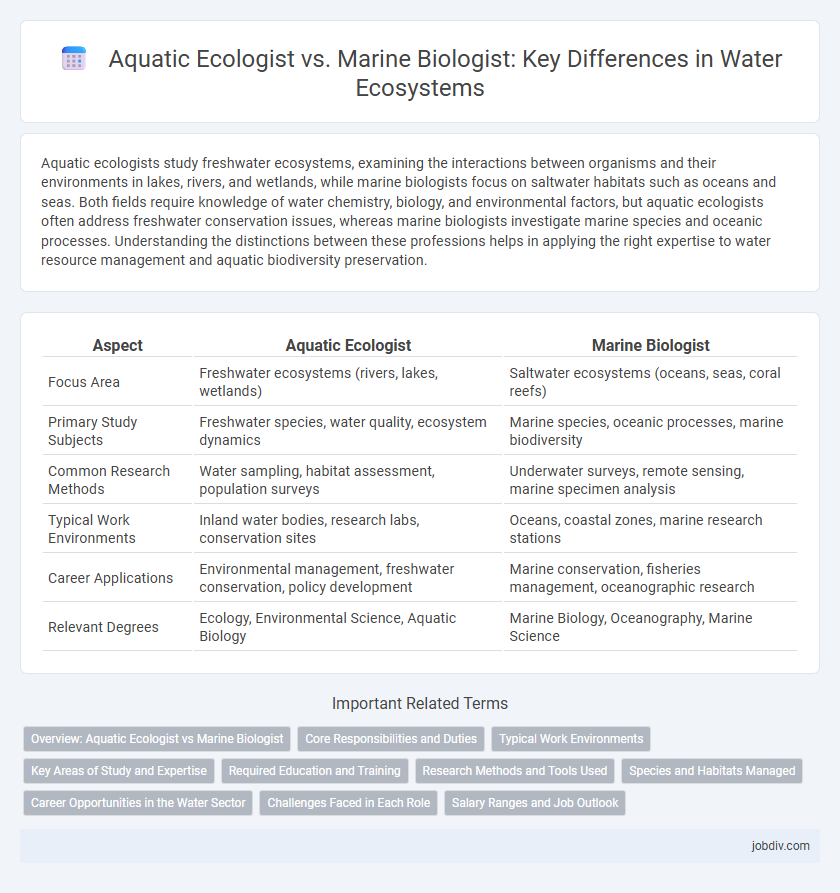Aquatic ecologists study freshwater ecosystems, examining the interactions between organisms and their environments in lakes, rivers, and wetlands, while marine biologists focus on saltwater habitats such as oceans and seas. Both fields require knowledge of water chemistry, biology, and environmental factors, but aquatic ecologists often address freshwater conservation issues, whereas marine biologists investigate marine species and oceanic processes. Understanding the distinctions between these professions helps in applying the right expertise to water resource management and aquatic biodiversity preservation.
Table of Comparison
| Aspect | Aquatic Ecologist | Marine Biologist |
|---|---|---|
| Focus Area | Freshwater ecosystems (rivers, lakes, wetlands) | Saltwater ecosystems (oceans, seas, coral reefs) |
| Primary Study Subjects | Freshwater species, water quality, ecosystem dynamics | Marine species, oceanic processes, marine biodiversity |
| Common Research Methods | Water sampling, habitat assessment, population surveys | Underwater surveys, remote sensing, marine specimen analysis |
| Typical Work Environments | Inland water bodies, research labs, conservation sites | Oceans, coastal zones, marine research stations |
| Career Applications | Environmental management, freshwater conservation, policy development | Marine conservation, fisheries management, oceanographic research |
| Relevant Degrees | Ecology, Environmental Science, Aquatic Biology | Marine Biology, Oceanography, Marine Science |
Overview: Aquatic Ecologist vs Marine Biologist
Aquatic ecologists study freshwater environments such as rivers, lakes, and wetlands, focusing on ecosystem interactions and biodiversity within these habitats. Marine biologists specialize in saltwater environments like oceans and seas, examining marine organisms, their behaviors, and the impact of environmental changes on marine life. Both fields contribute to understanding aquatic ecosystems but differ primarily in the type of water bodies and organisms they investigate.
Core Responsibilities and Duties
Aquatic ecologists study freshwater ecosystems, including rivers, lakes, and wetlands, focusing on the interactions between organisms and their environment to assess ecosystem health. Marine biologists specialize in saltwater environments such as oceans and seas, researching marine species, habitats, and ecological processes affecting biodiversity. Both professionals conduct field research and data analysis, but aquatic ecologists emphasize freshwater conservation and pollution impact, while marine biologists prioritize marine organism behavior and habitat preservation.
Typical Work Environments
Aquatic ecologists primarily study freshwater ecosystems such as rivers, lakes, and wetlands, conducting fieldwork in inland water bodies to assess ecological health and biodiversity. Marine biologists focus on saltwater environments including oceans, coral reefs, and estuaries, often performing research aboard research vessels or in coastal laboratories. Both professions require extensive outdoor work, but aquatic ecologists are more likely to operate in freshwater settings while marine biologists engage predominantly in marine habitats.
Key Areas of Study and Expertise
Aquatic ecologists primarily focus on freshwater ecosystems such as rivers, lakes, and wetlands, studying the relationships between organisms and their environment. Marine biologists specialize in oceanic and coastal ecosystems, examining marine species, coral reefs, and oceanic processes. Both fields require expertise in ecology, biology, and environmental science but differ in habitat specificity and the scale of aquatic environments studied.
Required Education and Training
Aquatic ecologists typically require a bachelor's degree in ecology, environmental science, or biology, with many positions favoring a master's or Ph.D. focused on freshwater ecosystems. Marine biologists need a bachelor's degree in marine biology, oceanography, or a related field, often complemented by graduate studies specializing in marine organisms and ocean systems. Both professions involve extensive fieldwork and laboratory experience, but marine biologists may require specialized training in scuba diving and oceanographic research methods.
Research Methods and Tools Used
Aquatic ecologists employ techniques such as water quality sampling, bioassessment using indicator species, and remote sensing to study freshwater ecosystems and their biodiversity. Marine biologists utilize tools including submersibles, sonar mapping, and molecular analysis to investigate oceanic life, habitats, and ecological processes. Both fields rely on GIS technology and statistical modeling to interpret complex environmental data and assess ecosystem health.
Species and Habitats Managed
Aquatic ecologists study freshwater species and habitats, including rivers, lakes, wetlands, and estuaries, focusing on ecosystem interactions and water quality. Marine biologists specialize in saltwater environments, managing marine species such as corals, fish, and marine mammals within oceans and seas. Both professionals play critical roles in preserving biodiversity and maintaining healthy aquatic ecosystems across diverse habitats.
Career Opportunities in the Water Sector
Aquatic ecologists specialize in the study of freshwater ecosystems, focusing on rivers, lakes, and wetlands, which opens career opportunities in environmental consulting, conservation agencies, and water resource management. Marine biologists concentrate on saltwater environments such as oceans and coastal habitats, leading to roles in marine research institutions, fisheries management, and marine conservation organizations. Both fields demand expertise in water quality assessment and ecosystem dynamics, with growing job prospects due to increasing environmental awareness and climate change impacts on aquatic systems.
Challenges Faced in Each Role
Aquatic ecologists confront challenges like monitoring freshwater ecosystems impacted by pollution, invasive species, and fluctuating water levels, requiring expertise in limnology and habitat restoration. Marine biologists face difficulties studying vast, often inaccessible ocean environments, dealing with issues such as climate change effects, coral bleaching, and the complexity of marine biodiversity. Both roles demand robust data collection and analysis skills to address environmental changes and support conservation efforts effectively.
Salary Ranges and Job Outlook
Aquatic ecologists typically earn salaries ranging from $50,000 to $85,000 annually, focusing on freshwater ecosystems, whereas marine biologists' salaries average between $55,000 and $90,000, specializing in oceanic life. Job outlook for aquatic ecologists is projected to grow by 8% over the next decade due to freshwater conservation efforts, while marine biologists face a faster 11% growth rate driven by increasing marine research and climate change impact studies. Both professions require strong scientific expertise, but marine biologists often experience higher demand in coastal regions with research institutions and governmental agencies.
Aquatic Ecologist vs Marine Biologist Infographic

 jobdiv.com
jobdiv.com